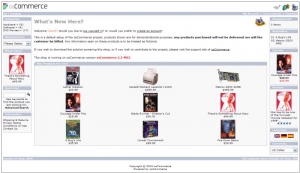WordPress vs osCommerce
June 13, 2023 | Author: Sandeep Sharma
49

WordPress is web software you can use to create a beautiful website or blog. We like to say that WordPress is both free and priceless at the same time. The core software is built by hundreds of community volunteers, and when you’re ready for more there are thousands of plugins and themes available to transform your site into almost anything you can imagine.
WordPress and osCommerce are both content management systems, but they have distinct differences in their focus and features. WordPress is a popular and widely-used platform primarily known for its capabilities as a blogging and website creation tool. It offers a user-friendly interface, a vast selection of themes and plugins, and extensive customization options. WordPress is suitable for users of all skill levels and can be used to build various types of websites, including e-commerce sites.
osCommerce, on the other hand, is an open-source e-commerce platform specifically designed for creating online stores. It provides a comprehensive set of features for managing products, inventory, orders, and payments. osCommerce offers a range of customization options and supports a wide variety of payment gateways. It is suitable for users who require a dedicated e-commerce solution and want to focus on building an online store with advanced e-commerce functionalities.
See also: Top 10 Online Store Builders
osCommerce, on the other hand, is an open-source e-commerce platform specifically designed for creating online stores. It provides a comprehensive set of features for managing products, inventory, orders, and payments. osCommerce offers a range of customization options and supports a wide variety of payment gateways. It is suitable for users who require a dedicated e-commerce solution and want to focus on building an online store with advanced e-commerce functionalities.
See also: Top 10 Online Store Builders
WordPress vs osCommerce in our news:
2023. Automattic launches an AI writing assistant for WordPress
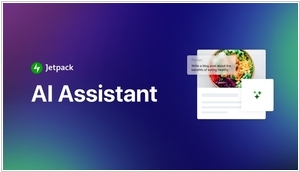
Automattic has introduced an AI assistant for the widely used content management system Wordpress.com. Now, when composing a post or page, users have the option to incorporate an "AI Assistant" block into their content. By inputting prompts in natural language, users can avail themselves of the AI assistant's text generation capabilities. Beyond providing content suggestions, the AI assistant can facilitate the creation of organized lists and tables within blog posts. Additionally, it has the ability to adjust the tone of a post, adding elements of informality, skepticism, humor, confidence, or empathy. The assistant can also generate post summaries and propose suitable titles. Initially, the Jetpack AI Assistant block offers a complimentary trial allowing users to submit 20 requests. Subsequently, a subscription fee of $10 per month is required to access this feature.
2021. Automattic acquires analytics company Parse.ly

Automattic, the profit-making company associated with the open-source web publishing platform WordPress, has recently completed the acquisition of the analytics provider Parse.ly. Parse.ly equips creators, marketers, and developers with tools to gain insights into content performance, demonstrate its value, and deliver personalized content experiences that yield meaningful outcomes. While WordPress and Parse.ly already exhibit compatibility, the objective is to enable Parse.ly customers to access WPVIP features (enterprise hosting and support for publishers) and enhance the availability of Parse.ly data to WPVIP publishers. Additionally, there exists potential to incorporate more commerce-related data into Parse.ly, considering Automattic's ownership of WooCommerce.
2016. WordPress.com turned on HTTPS encryption for all sites
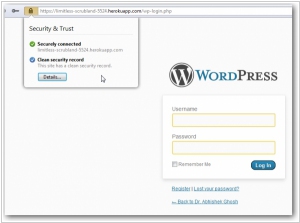
WordPress.com is implementing automatic HTTPS support for all its sites, requiring no user action. Each website is now equipped with an SSL certificate, which is indicated by a green lock in the address bar. Besides the heightened security, this improvement has the added benefit of Google's preference for HTTPS-supported websites over those limited to HTTP. Consequently, your WordPress.com website is expected to achieve higher rankings in Google search results.
2015. WordPress.com goes Open Source and gets a desktop app

The fully hosted version of WordPress, known as WordPress.com, has recently undergone a significant update. The first major change is the complete separation of WordPress.com from the WordPress core. It now functions as an admin interface that interacts with the WordPress core similar to other third-party interfaces and apps. This is achieved through the utilization of a REST API, enabling tasks such as fetching posts, publishing new content, and uploading photos. Secondly, the WordPress.com development team has transitioned to an entirely new stack. Instead of relying on PHP and MySQL, they have built the platform using JavaScript and API calls. Consequently, when accessing the website, the server distributes a fully functional WordPress client that primarily runs within the user's browser. Lastly, the entire system is open source and hosted on GitHub. Additionally, a new Mac app is available for download, offering an alternative way to access WordPress.com. Similar to the Slack desktop app, it harnesses web technologies and desktop features to provide users with a comparable experience to the WordPress.com website, along with extra features like notifications. Windows and Linux apps are currently in progress and will be released in the future.
2015. WordPress acquired e-commerce plugin WooCommerce

Automattic, the company responsible for WordPress, has made an acquisition by acquiring WooCommerce, the developer of a highly popular e-commerce WordPress plugin. This plugin enables website owners to effortlessly transform their self-hosted WordPress sites into fully functional online stores. With a staggering presence in the online store landscape, WooCommerce powers a substantial number of over 650,000 online stores. While WooCommerce offers user-friendly features, especially compared to other e-commerce solutions, it still requires some assistance during the initial setup process. The demand for easy-to-use shopping solutions is increasingly becoming a key selling point for web-based platforms. Competitors of WordPress.com, such as Squarespace, have integrated storefront modules, and other companies like Shopify, Big Cartel, and Bigcommerce offer hosted solutions to cater to this growing market.
2014. osCommerce integrates with Paypal

osCommerce has introduced the PayPal app for osCommerce Online Merchant, providing an enhanced integration with PayPal. The collaboration between osCommerce developers and PayPal has resulted in updated PayPal payment modules, including the inclusion of Log In with PayPal, bundled into a single app package. This integration aims to improve the overall experience for both sellers and buyers using PayPal on the osCommerce platform. Notably, osCommerce is one of the first self-hosted e-commerce solutions that allows the PayPal app to configure itself by securely retrieving the PayPal account API Credentials on behalf of the user. Currently available for sellers in the US and UK, this feature enables easy sign-in or creation of a PayPal live or sandbox account to retrieve the necessary API Credentials. This streamlined process allows new PayPal sellers to quickly access PayPal payment methods through a sandbox account and seamlessly transition to a live account when they are ready to accept payments, directly from the osCommerce Administration Dashboard.
2014. WordPress, Squarespace offer website CMS for Google Apps customers

Website CMS providers, WordPress and Squarespace, have recently become part of the Google for Work Partner Program, offering users access to two highly flexible content management systems (CMS) tailored for small businesses. The Google for Work Partner Program already includes website building services such as Wix, Weebly, and Bluehost. The program's core services encompass popular tools like Gmail, Hangouts, Calendar, Google+, Drive, Docs, Sheets, Forms, Slides, Sites, Admin, and Vault. The integration of Squarespace and WordPress with Google for Work provides users with user-friendly content management solutions, efficiently addressing their daily requirements. Furthermore, the integration process with these platforms is made simple through the availability of APIs, enabling seamless incorporation of Google Apps into their interfaces.
2014. Microsoft makes scaling WordPress on Azure easier
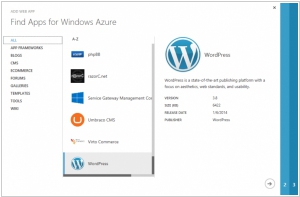
WordPress is widely recognized as one of the leading web content management systems for the Enterprise. However, when it comes to scaling up for high-traffic websites, it can pose challenges. To address this, Microsoft has been providing the option to effortlessly establish a WordPress site using Azure Websites. Now, Microsoft takes it a step further by introducing a highly scalable solution. Azure users can navigate to Azure's App Gallery and deploy what Microsoft refers to as "Scalable WordPress." This process involves a few simple clicks, setting up Azure Storage to store all media assets, and granting access to a curated collection of performance-optimized WordPress plugins. Unlike the standard WordPress installations on Azure, this solution utilizes a higher-end (and pricier) MySQL database. WP Engine and Pantheon are among the recent entrants in offering specialized WordPress hosting services. Unlike Azure, these platforms provide a fully managed service. Nonetheless, Microsoft aims to attract businesses that are capable and willing to manage their own WordPress installations by simplifying the setup of a scalable version on its platform.
2014. osCommerce gets a new content modules
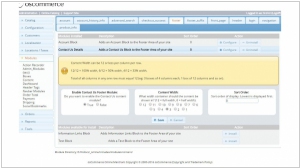
osCommerce has recently launched osCommerce Online Merchant v2.3.4, their latest version of the e-commerce CMS. This release comes with several notable enhancements, including the introduction of a new feature called Content Modules. If SSL is enabled, the Administration Tool is now secured. Additionally, new and updated payment modules have been included. Content Modules is an innovative addition that enables the creation and loading of page content through modules. In this release, the My Account, Login, and Checkout Success pages have been revamped to incorporate Content Modules. This enhancement allows for easy customization and manipulation of these pages using modules, eliminating the need to modify source code files. Further updates to include Content Modules on other pages will be implemented in upcoming releases. Your valuable input and feedback will contribute to improving these updates.

